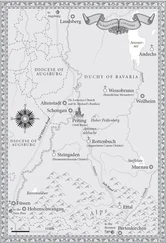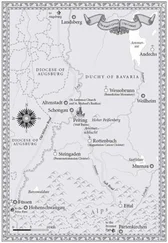Oliver Potzsch - The Beggar King
Здесь есть возможность читать онлайн «Oliver Potzsch - The Beggar King» весь текст электронной книги совершенно бесплатно (целиком полную версию без сокращений). В некоторых случаях можно слушать аудио, скачать через торрент в формате fb2 и присутствует краткое содержание. Жанр: Исторический детектив, на английском языке. Описание произведения, (предисловие) а так же отзывы посетителей доступны на портале библиотеки ЛибКат.
- Название:The Beggar King
- Автор:
- Жанр:
- Год:неизвестен
- ISBN:нет данных
- Рейтинг книги:5 / 5. Голосов: 1
-
Избранное:Добавить в избранное
- Отзывы:
-
Ваша оценка:
- 100
- 1
- 2
- 3
- 4
- 5
The Beggar King: краткое содержание, описание и аннотация
Предлагаем к чтению аннотацию, описание, краткое содержание или предисловие (зависит от того, что написал сам автор книги «The Beggar King»). Если вы не нашли необходимую информацию о книге — напишите в комментариях, мы постараемся отыскать её.
The Beggar King — читать онлайн бесплатно полную книгу (весь текст) целиком
Ниже представлен текст книги, разбитый по страницам. Система сохранения места последней прочитанной страницы, позволяет с удобством читать онлайн бесплатно книгу «The Beggar King», без необходимости каждый раз заново искать на чём Вы остановились. Поставьте закладку, и сможете в любой момент перейти на страницу, на которой закончили чтение.
Интервал:
Закладка:
“But the war ended long ago,” Magdalena interrupted with a laugh. “You’re seeing ghosts!”
“The war may be over, but the scars remain.”
Magdalena didn’t get to ask her mother what she meant, because at that moment they heard footsteps and whispers in front of the house.
And in the next moment chaos broke out.
Simon washed the sweat from his face at a little washbasin in the consulting room, then buttoned his jacket and stepped warily out of the house.
All day the young medicus had been treating consumptive farmers, feverish children, and old women covered in boils. Since the hangman had been away, over a week now, more patients than ever had visited the Fronwieser house in the Hennengasse. Simon’s father had retired upstairs to his room with a terrible hangover and needed treatment himself. Simon had his hands full. Only now, after sundown, did he find the time to visit Magdalena down in the Tanners’ Quarter. He needed to speak with her, alone, to discuss Michael Berchtholdt’s threats. Just the day before he’d agreed with Magdalena that she should enter an official complaint against the master baker, but in the course of the day he’d begun to wonder whether that really was such a sensible idea. Berchtholdt still held a seat in the city’s Outer Council, and his voice carried weight-in stark contrast to Simon’s, and especially Magdalena’s as the eldest daughter of the dishonorable Schongau hangman.
In the meanwhile night had fallen. With lantern in hand, the medicus crept through the pitch-black streets of Schongau. At every corner he paused and listened for the footsteps of the night watchmen. Only when the streets were completely silent did he dare proceed, always on the lookout for curious neighbors who might happen to be watching from their windows. No one in Schongau was permitted out after nightfall, and anyone the constables caught would face a hefty fine. On account of an occasional late night of drinking and his frequent visits to Magdalena, Simon had already parted with a not insignificant amount of money. If he was caught just once more, he ran the risk of being put in the stocks or having to wear the scold’s bridle. The medicus shuddered at the thought of being punished by none other than Magdalena’s father-and of being the laughingstock of the entire town.
When Simon noticed light flickering down by the Lech Gate, he quickly covered his lantern with his jacket. Relieved, he then realized that the light was coming from the gatekeeper, Josef. The old constable had often let him pass through the narrow one-man door so he might visit the Kuisls. A modest bribe of brandy or watered-down theriaca was cheaper for Simon than the punishment for being caught leaving the city at night. As he drew closer, however, he noticed something odd. Josef’s face was as white as chalk, and his lips were pinched tightly together.
“Where-where are you going at this late hour?” the old man stammered, clutching his halberd tightly as if he might fall over without it.
“Oh, come now, Josef.” He raised his hands in a conciliatory gesture. “You know I’m going to see Magdalena. How about a nightcap, as usual?” He pulled a little corked bottle out from under his jacket.
The constable shook his head nervously. “I don’t think that’s such a good idea tonight. It would be better for you to stay in town.”
“Why…” Simon began. At that moment he heard sounds down below, a rattling and howling, all to the accompaniment of an out-of-tune fiddle. The medicus didn’t bother finishing his sentence, pushed the watchman aside, and ran to the doorway.
“Fronwieser, no!” Josef shouted after him. “You’re going to regret it!”
Simon wasn’t listening anymore. He unhooked the rusty latch, ducked through the shoulder-high door, and ran down the street toward the raft landing. As he ran, he saw bright lights flickering in the Tanners’ Quarter. The noise was coming from that direction, and the sound was getting louder, swelling to a thunderous beat that reminded him of the Swedes’ drumming just before they set fire to the town long ago. One man appeared to be shouting, and a chorus of voices answered-then the drumming continued. Simon could at last identify the lights as hand-held torches and lanterns, little points of light all in a row, advancing like a glittering snake toward its goal.
The hangman’s house.
Simon stumbled more than he ran-the cobblestones by the raft landing were still slick from the thunderstorm earlier that night-but finally he arrived at the Tanners’ Quarter and ducked behind a cart laden with sweet-smelling hay to watch what was unfolding.
Two or three dozen young men had gathered there, journeymen from Schongau and a few farmhands from the surrounding villages. They had blackened their faces with soot, and some of them wore sacks over their heads, their eyes peering out through slits and flashing white in the light of the torches. Despite their disguises Simon recognized a number of them by their voices and their gaits. In their hands they held threshing flails, rattles, and scythes with little bells attached in places. One of the journeymen had donned a hairy devil mask and leaped about in a sort of wild, demonic dance.
In the middle of the mob stood a man with a blackened face, a black coat, and a hat adorned with two white rooster feathers. It took the medicus a moment to realize that this was in fact Michael Berchtholdt. With his long, flowing robe and painted face, the lean master baker appeared bigger and more menacing. The others fell silent as Berchtholdt began to speak in a steady, strident singsong.
“The hangman girl, this Kuisl whore, she practices on you, and more. The belly swells, all plump and round, but her physician makes her sound. ’Tis true, my friends?”
The chorus of masked faces roared its reply in one voice: “’Tis true!”
“Then now you know just what to do!”
The rattling and stomping resumed once more, swelling now to an infernal racket. Meanwhile, in the nearby houses shutters had opened, but the faces that peered out seemed more amused than frightened by the clamorous, bloodthirsty mob below. How often, after all, did they get to see such a spectacle in sleepy little Schongau?
Simon crouched even lower behind the cart, trying desperately to figure out what to do. He’d heard of Vehmic tribunals and their secret vigilante proceedings, though never in Schongau. Their victims were often loose women or other members of society who had in some way offended the moral order: village drunks, lecherous priests, greedy estate farmers, or millers who had defrauded their customers. The medicus had heard that the accused were sometimes whipped and chased through the fields, but in most cases they suffered only the humiliation of public ridicule delivered in lines of satirical verse. Just last year in Kinsau, a few towns away, the young men of the village had smeared human waste all over the walls of the building belonging to the bathhouse owner and hoisted a manure cart up onto his roof. The victim had watched the spectacle in silence, knowing there wasn’t much he could do against the majority of villagers.
This last thought worried Simon. He couldn’t imagine Magdalena would ever tolerate such abuse without fighting back. Would she physically assault her accusers? Claw at their sooty faces with her nails? How would the men react? The physician looked uncertainly at the shuttered windows of the hangman’s house, just as Michael Berchtholdt started to declaim another satirical verse.
“She gives the maids her witches’ brew and turns them into demons, too. And takes them off to live in hell. ’Tis true, my friends? Do tell, do tell!”
“’Tis true!”
“Then now you know just what to do!”
Simon’s anger was rising, and his ears started to hum. Michael Berchtholdt was trying to turn the tables on her, to make it look as if Magdalena was responsible for what happened to Resl-and the others actually seemed to believe him! Simon knew he didn’t stand a chance, but someone had to try to stop this.
Читать дальшеИнтервал:
Закладка:
Похожие книги на «The Beggar King»
Представляем Вашему вниманию похожие книги на «The Beggar King» списком для выбора. Мы отобрали схожую по названию и смыслу литературу в надежде предоставить читателям больше вариантов отыскать новые, интересные, ещё непрочитанные произведения.
Обсуждение, отзывы о книге «The Beggar King» и просто собственные мнения читателей. Оставьте ваши комментарии, напишите, что Вы думаете о произведении, его смысле или главных героях. Укажите что конкретно понравилось, а что нет, и почему Вы так считаете.












